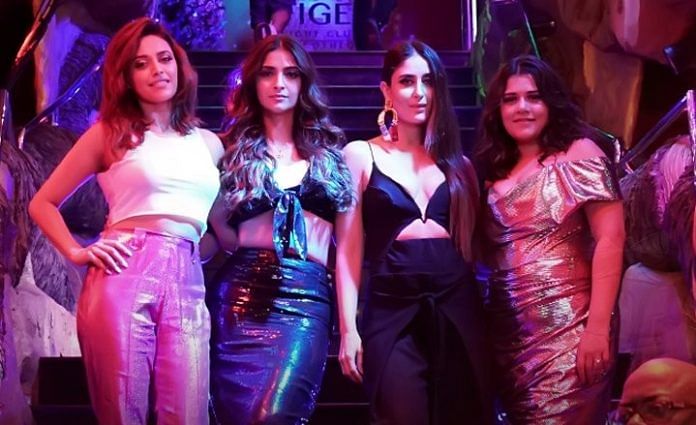It’s a relief to see women in a film talking to each other without having to sprinkle keywords that would sell the movie as one with a cause.
I have learned one thing from the movie Veere Di Wedding. Pedestals are exhausting, unnecessary, and constricting. They’ve also been somehow designed to fit women perfectly.
Pedestals look like they’re a step up. Until you try to get off them. As soon as you do, the ladder is pulled away from under your feet, and you fall down. And people will take videos of you falling down for their social media.
Women have always had pedestals of ideologies waiting for them. Earlier, it was the ‘good girl’ pedestal — where a woman had to be the stock image of a sati savitri who spent her life making a million tiny, invisible sacrifices to keep others happy. Now, it’s the pedestal of the ‘ideal feminist’, where every moment, every creative expression of a woman’s life, has to specifically be an overt, performative statement of rebellion. It has to be visibly wreathed by her loudly proclaimed story of oppression.
When do women get to have fun?
It’s important to be actively political and engage with the structures around us, yes. We’ve had, in recent years, good cinema trying to do exactly that.
However, by relegating every ‘women-centric’ film to the task of ‘raising awareness’, we forget that women, too, have complex, fraught inner lives that deserve a telling. Dismissing Veere Di Wedding simply because it does not frantically wave a flag is to say that women and their lives are only useful on screen when they perform the labour of educating people.
The personal lives of women have, unfortunately, always been discounted as ‘lesser art’. The self-absorbed meanderings of three men on a holiday (Zindagi Na Milegi Dobara) will often be considered an exploration of their emotions and lauded. Women doing the same will be told they are frivolous. Men talking about their struggle with marriage and how they navigate the same will be called a showcasing of vulnerability (Jay-Z’s 4:44 anyone?), while women doing the same will be labelled flakes. In literature, too, women who write about their own personal struggles are labelled straight-up crazy (ahem, Sylvia Plath), while the men?
They get to be called “the sensitive ones”.
Veere Di Wedding is not radically feminist. It’s not class-conscious, and it’s definitely not a lived experience you’d relate to unless you lived in Delhi’s poshest enclaves. It’s not a path-breaking film in many ways — it often reduces itself to lazily flipping over tropes instead of trying to subvert them. A lot of it, however, is very startlingly real, including the very contentious masturbation scene.
A lot of people alleged that being ‘shy’ about it made Swara Bhasker’s Sakshi ‘non-feminist’. Sounds great in theory, but a lot of women do, in fact, hide it from their lovers. The taboo surrounding the same permeates the most educated and privileged of classes too. To deny this as a reality does a disserve to an authentic expression of the fact that women exist at the crux of multiple identities at any given time. To deny them expression of the same is a very odd kind of feminism.
There is a lot to criticise Veere Di Wedding for as a movie itself: Ham-handed dialogues, casual, classist slurs thrown around with nonchalance, oblivious, first-world problems barely contextualised in a third-world country.
But it’s nice to see women enjoying themselves on screen without violence against them being used as a plot device to create conflict. It’s a relief to see women talking to each other without having to sprinkle keywords that would sell the movie as one with a cause. It’s delightful to see women just existing, without being forced with a whore-madonna dichotomy for swearing, drinking, or smoking. It was surprising to see the very casual mention of homosexuality without the virtue-signalling that usually follows it in other #woke movies.
It’s a rare masala flick that allows you to sit back and laugh without feeling terrible about the jokes because they (mostly) all punch up. I personally didn’t realise how much fun watching an inane movie can be when the jokes don’t feel like a personal attack after every few minutes. It’s not the grandest, most inclusive cinema in the world — and doesn’t claim to be so either. It’s nice to see women have fun without feeling guilty about it.
And I, too, refuse to feel guilt for enjoying it.
Harnidh Kaur is a poet and feminist.



